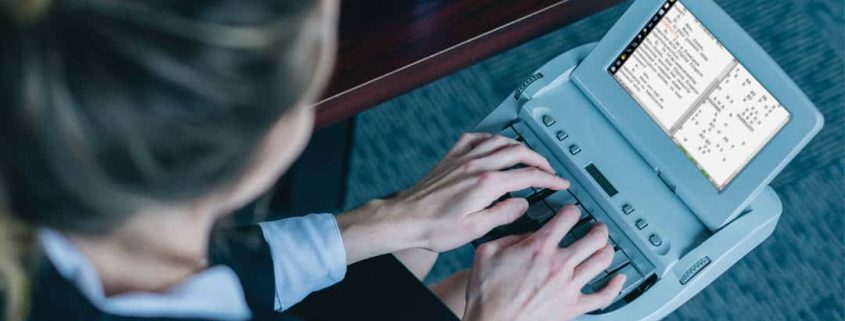4 Steps to Becoming a Court Reporter
The first steps toward beginning a career in court reporting can be as simple as working on some basic skills like keyboarding speed and accuracy while researching the basics of court reporter training. While the keyboards that court reporters use are very different from the classic QWERTY computer keyboards most people know very well, still it is helpful to be very proficient with typing skills. Listening skills are also important as court reporters must be able to hear conversations at the speed of normal spoken speech, understand the words of each sentence, and take them all down correctly.
Experts predict a steady growth in the field of court reporting over the next few decades. Court reporters are in demand in legal and business proceedings all over the country. Starting the steps to beginning a career in court reporting today can lead to a rewarding and successful career for the future.
Step One: Scout the Field
There is a lot to understand about court reporting in general, and about the details of how to begin a career as a court reporter, also called a stenographer. Schools and training programs, certifications and tests, state requirements, job prospects, keyboarding prerequisites, and much more, all go into the education of a court reporter. So, to begin, the interested student must learn where to go to learn the art and science of stenography. A review of programs and course available will help to narrow down the choices to those that are convenient to the student’s life and schedule and affordable for the budget.
Step Two: Start School
A court reporter must learn how to listen to live speech, understand each word spoken, and take down all the words exactly, to create a record of the proceeding. The ability to type up words as quickly as they are spoken is based on a shorthand code that all stenographers learn. Most modern stenographers still use the small black keyboard machine that is familiar from courtrooms and movies and television about the law.
The stenography machine uses 22 black keys to let the stenographer create all the combinations that represent sounds of spoken language. A court reporter must be able to take down at least 225 words a minute, which is far beyond the maximum typing speed on a standard keyboard, of course. By use of the shorthand code, the stenographer can keep up with the flow of speech as it is spoken. The code is translated from shorthand into English, usually by a computer, now, allowing real time viewing of the words as they are spoken.
Step Three: Certification
After school training, most court reporters will pass a certification test. Every state has a unique set of requirements that vary depending on whether the applicant will be working in a courtroom setting or not. The test will usually involve written and performance aspects, testing typing speed, proofreading skills, vocabulary comprehension and much more. For students who have just finished the education process, the certification test should not be too difficult. Organizations such as the National Court Reporters Association offer certification for court reporters, as well. To be certified as a Registered Professional Reporter (RPR) an applicant must pass a written test and skills tests that requires minimum typing speed and other abilities to be proficiently demonstrated.
Step Four: The Job Market
Work is available for those who are beginning a career in court reporting in various areas. Some job specific training is usually expected while learning the profession, with on the job training may be available with court reporting agencies or government positions. With a growing demand anticipated for court reporters, as well as related fields of those who provide real time captioning and reporting services for the hearing restricted, it seems to be a very good time to consider beginning a career in court reporting. The investment of time and cost in training and certification will take some effort, but the potential of a quality career providing a useful service to the legal and business world is very appealing.






